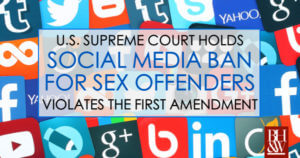 In today’s world Internet access has become virtually unlimited. And, with new technology come new problems. These problems have led the Supreme Court to address the challenge modern day Internet access has created for the First Amendment in the landmark case, Packingham v. North Carolina. In Packingham, the Court was asked to determine whether a North Carolina law, which makes it a felony for a registered sex offender to access a social media-networking site, violates the First Amendment’s free speech clause.
In today’s world Internet access has become virtually unlimited. And, with new technology come new problems. These problems have led the Supreme Court to address the challenge modern day Internet access has created for the First Amendment in the landmark case, Packingham v. North Carolina. In Packingham, the Court was asked to determine whether a North Carolina law, which makes it a felony for a registered sex offender to access a social media-networking site, violates the First Amendment’s free speech clause.
North Carolina Imposed a Social Media Ban for all Registered Sex Offenders
In 2002, Lester Packingham, a 21-year-old student, pled guilty for taking indecent liberties with a child after having sex with a 13-year-old girl. As such, Packingham was required to register as a sex offender. However, in 2010 Packingham posted to his personal Facebook account thanking God after he received a dismissal for a traffic ticket. This post was observed by a police officer and Packingham was ultimately convicted for violating the social media ban for sex offenders. After making it all the way to the United States Supreme Court, Packingham’s conviction has now been overturned.
Supreme Court holds that Banning Sex Offenders from Social Media Violates the First Amendment
In overturning Packingham’s case, the Court ruled the North Carolina law to be an impermissible restriction of lawful speech. The Court has consistently held that “[a] fundamental principle of the First Amendment is that all persons have access to places where they can speak and listen, and then, after reflection, speak and listen once more.” As such, the Court ruled that one of the most fundamental places to exchange views is cyberspace—particularly social media platforms. Social media has evolved and formed a stage for many topics protected by the First Amendment, including human thought. It has evolved so much so that “seven in ten American adults” now use at least one form of social media. Thus, the Court reasoned that while it may have once been difficult to determine which “places” are important for the exchange of ideas, it is now clear.
The Internet allows people access to vast amounts of information, which people need to thrive in modern society. North Carolina prohibited access to this information in an effort to protect children, but they ended up preventing Packingham from gaining access to large amounts of information — information unlikely to further sex crimes. As a result, the Court agreed that sex crimes involving children are repugnant, but it explained that even a valid government interest cannot escape all constitutional protections. The Court further noted that “[e]ven convicted criminals—and in some instances especially convicted criminals—might receive legitimate benefits from these means for access to the world of ideas, particularly if they seek to reform and to pursue lawful and rewarding lives.” Thus, the Court determined that North Carolina did not meet its burden to show why the overly broad law was necessary to serve its purpose of protecting children and subsequently declared the law unconstitutional.
For further analysis, see: Amy Howe, Opinion analysis: Court invalidates ban on social media for sex offenders, SCOTUSblog (Jun. 19, 2017, 1:52 PM), http://www.scotusblog.com/2017/06/opinion-analysis-court-invalidates-ban-social-media-sex-offenders/










